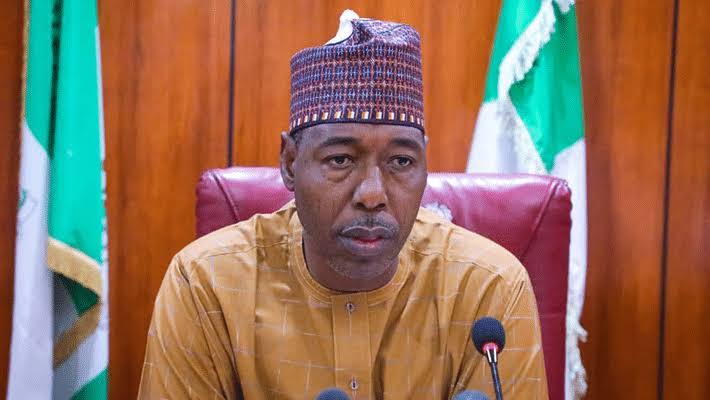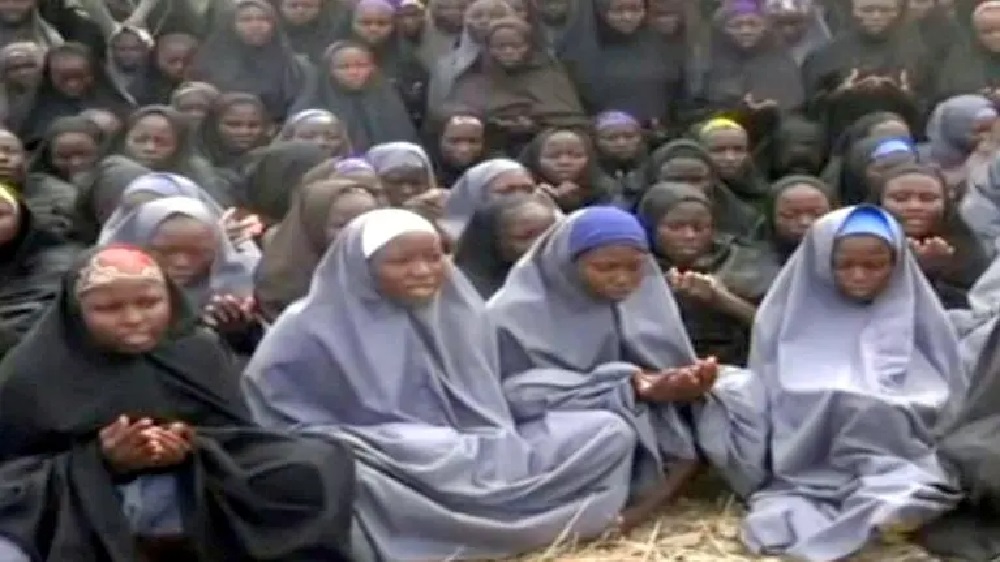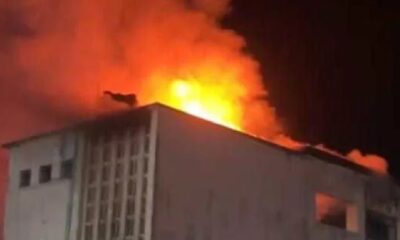News
FG, govs decide on state police next week

The Federal Government and the state governors will next week take decisions on the creation of state.
The Governor of Bayelsa State, Duoye Diri, disclosed this to State House Correspondents in Abuja on Thursday after the National Economic Council.
Diri revealed that the NEC gave Adamawa, Kebbi and Kwara states and the FCT one week (November 28) to submit their positions on the proposed creation of state police.
He said by the time the NEC convened again next week a decision would be taken.
“On the issue of state police today, when the decision was taken, even before it was, the three states in question, one of them (Adamawa) was represented by the Deputy Governor, had earlier made submissions that they presented their report.
“So, that was why NEC could not come out immediately to say ‘A or B,’ but rather gave a timeline. And that timeline, as you can see, was very short: one week for them to go and do whatever they are doing so that decisions will be made by the next NEC meeting. And, from how they reacted, I’m sure that maybe we have some bureaucracy regarding the submission,” Diri said.
On the one-week deadline given to the three defaulting states, he said, “The Council mandated these remaining states and the FCT to make their submissions within the next one week.
“On the state police, Council was updated with the submission of the establishment of state police, and it was reported that 33 states have submitted their positions, while three states are yet to do so.
“These three states are Adamawa, Kebbi and incidentally Kwara, which is the chairman of our forum, and the FCT are yet to submit their positions.
“The Council mandated these remaining states and the FCT to make their submissions within the next one week and resolved to present a consolidated state’s position on the state police to the National Economic Council at our next meeting.”
On February 15, 2024, the Federal Government, alongside the 36 states, began talks expected to culminate in the creation of state police.
This formed part of agreements reached at an emergency meeting between President Bola Tinubu and state governors at the Aso Rock Villa, Abuja.
It followed the pockets of insecurity recorded nationwide, hikes in food prices and economic hardship.
Addressing State House Correspondents afterwards, the Minister of Information and National Orientation, Mohammed Idris, explained that the process was still in its infancy and would only take shape after more deliberations between stakeholders.
“The Federal Government and the state governments are mulling the possibility of setting up state police,” said Idris, adding that “this is still going to be further discussed.”
He explained, “A lot of work must be done in that direction. But if our government and the state governments agree to the necessity of having state police, this is a significant shift.”
Two days earlier, the House of Representatives said it was considering a legislative bill titled, ‘A bill for an Act to alter the constitution of the Federal Republic of Nigeria, 1999, to provide for the establishment of State Police and related matters.’
Following this agreement, the National Economic Council requested each state to submit detailed reports outlining their positions and plans for implementing state police. By March 2024, 16 states had submitted their reports, with the remaining 20 expected to do so by May.
In April 2024, the Nigeria Governors’ Forum announced that the decisions of the remaining 20 governors were ready for submission to the NEC, indicating a unified commitment among the states to establish state police forces.
Despite these, as of November 2024, the implementation of state police remains only in the planning stages as the FG and state authorities continue to debate on the constitutional amendments required to empower states to establish and manage their police forces.
The debate for creating state police in Nigeria primarily stems from the centralised nature of the Nigerian Police Force, which many security pundits perceive as inadequate for addressing the unique security challenges across the country’s diverse regions.
Proponents argue that the outfit would bring law enforcement closer to the communities they serve, enhance the effectiveness of policing, and allow for more localised control over security matters.
However, opponents fear that state police could lead to the abuse of power, particularly in states with strong political control, potentially exacerbating regional tensions and undermining national unity.
News
Zulum orders arrest, offers house, scholarship to abused boy in viral video

Borno State governor, Babagana Umara Zulum, has ordered the immediate arrest and prosecution of one Bukar Modu, who was seen allegedly molesting a minor, Bashir Gaji, in a viral video that has sparked outrage on social media.
Security operatives arrested Modu on Saturday night in Umarari, Maiduguri, following the governor’s directive.
Governor Zulum met with the victim, little Bashir Gaji, on Sunday at the Government House in Maiduguri.
During the meeting, the governor condemned the incident in strong terms, saying, “This heinous act is an affront on our values and a betrayal of our duty to protect our children, students and minors who are under our guardianship,” Zulum said.
“We cannot tolerate such actions perpetually repeating itself. I am directing the relevant authorities to move swiftly and ensure that this individual faces the full extent of the law. Our children deserve a safe environment to grow and become meaningful members of society.”
He also directed the Ministry of Women Affairs and Social Development to develop strategies for enhanced community sensitisation.
The aim is to educate families, traditional teachers, and guardians on proper, non-abusive ways of disciplining children.
As part of efforts to support the victim, Governor Zulum announced that the government would provide a fully furnished house for Gaji’s family and also award the child a scholarship to cover his education.
According to reports, the boy and his family currently reside in an Internally Displaced Persons (IDP) camp in Monguno Local Government Area after his father was killed by Boko Haram insurgents.
News
Oluwo raises alarm over brewing Osun-Oyo border dispute

The Oluwo of Iwo, Oba Abdulrosheed Akanbi, has raised alarm over a looming interstate conflict between Osun and Oyo States stemming from a long-standing land dispute.
In a statement issued on Sunday night, the monarch called on Osun State Governor, Senator Ademola Adeleke, and his Oyo State counterpart, Governor Seyi Makinde, to urgently harmonize stakeholder interests to prevent a potential clash.
Oba Akanbi pointed to rising tensions between residents of the Oke Oba axis of Iwoland (Osun State) and the Lagelu area of Ibadan (Oyo State), describing the situation as a brewing territorial crisis.
He noted that the dispute has been under the purview of the National Boundary Commission for years, with a comprehensive report already prepared and awaiting public presentation, pending facilitation by both state governors.
The Oluwo accused individuals from the Lagelu area of illegal land grabbing, claiming they have been forcefully taking over land and attacking villagers in several Iwoland communities, including Ogunajo, Eleye, Molamu, Paku, Ejemu Oja, Oloya, Arikese, Eleweran, Olofa Ogundiran, and Molafe.
He urged the two governors to consult the clearly defined boundary map established in 1991 when Osun State was carved out of the old Oyo State.
“As a peace-loving Royal Father,” Oba Akanbi stated, “I appeal to the Governors of Osun and Oyo States, Senator Nurudeen Jackson Ademola Adeleke and Engr. Seyi Makinde respectively, to harmonize their interests in resolving the long-standing boundary dispute between the people of Oke Oba Papa Axis of Iwoland and the Lagelu area of Ibadan.”
“Just yesterday, these land grabbers from Lagelu mobilized again for an onslaught against the people of Oke Oba villages in Iwoland. They have committed arson by destroying both public and private properties. They have sacked teachers and students from classrooms. I feared further silence may degenerate into a larger event if not timely curtailed.
“The palaces of some Baales were completely destroyed. Oloola Molamu Oyin was razed last week. Osun has District Council Primary school and maternity there. The people of these villages have Osun State polling units during elections. They have removed the roof of all these government facilities. They removed the roof, loot and set ablaze the palace. They took Over people’s farms, harvested their goods and rubbed them at gunpoint. They have their thugs stationed at these villages till date with guns and other deadly weapons.”
News
UN deputy secretary general, others storm UK for Chibok girls

United Nations (UN) Deputy Secretary-General, Amina Mohammed, Emir of Kano, Emir Muhammadu Sanusi II and Chief Operation Officer (COO), Murtala Muhammed Foundation (MMF), Dr. Aisha Muhammed-Oyebode, will today join other global speakers at the 11th year programme of the Chibok Girls abduction, with photo exhibition and commemoration in London, the United Kingdom.
The event with the theme: “A Decade On: Chibok Photo Exhibition and Commemoration”, will hold at SOAS, University of London, in the UK.
Dr. Muhammed-Oyebode, in a statement yesterday, said she would lead global panellists in a discussion titled: “The Stolen Daughters of Chibok: Resilience, Justice and Global Lessons”.
It will also feature photo exhibition, bringing together global leaders, scholars and advocates to reflect on the enduring tragedy and its impact on education, gender and conflict recovery.
Muhammed-Oyebode, whose advocacy has been instrumental in keeping the Chibok narrative alive, will open the session with remarks contextualising the ongoing plight of the girls and the communities affected by insurgency in Nigeria.
She said: “This isn’t just history – this is a continuing horror. We gather not only to honour the stolen daughters of Chibok, but also to hold the world accountable for allowing impunity to thrive, while generations of girls are silenced by violence.
“The programme will include contributions from UN Deputy Secretary-General, Amina Mohammed, Bulama Bukarti, Osai Ojigho and Dr. Elizabeth Pearson, with an address from Emir Muhammadu Sanusi II, who serves as the honorary patron of the accompanying photo exhibition.’’
-

 News22 hours ago
News22 hours agoFire engulfs presidential villa
-

 News17 hours ago
News17 hours agoTinubu’s ugly past shores up as US Judge orders DEA, FBI to release files
-

 News21 hours ago
News21 hours agoBig waste! Man with PhD in Maths works as cleaner, messenger in Nigerian University
-

 News5 hours ago
News5 hours agoAutonomy: 774 LGs challenge FG, states in court Tuesday
-

 Sports15 hours ago
Sports15 hours agoJust in: Newcastle pummel Man United 4-1
-

 Education22 hours ago
Education22 hours agoJAMB releases 2025 mock UTME results
-

 News15 hours ago
News15 hours ago2027: Atiku’s Opposition Front is a mission impossible-Wike declares
-

 Economy21 hours ago
Economy21 hours agoSEE Current Black Market Dollar (USD) To Naira (NGN) Exchange Rate

















